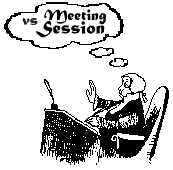TIPS
on Parliamentary
Procedure
According to
Robert's
RULES OF
ORDER

 A Meeting vs. a Session
A Meeting vs. a Session
- The significance of a session lies in the freedom of each session.
- One session can not tie the hands of the majority at any later session, or place a question beyond the reach of a later session. The rights of the majority of one session can not adversely affect the rights of a majority of a later session. Powerful stuff!
- One of Robert's fundamental rules is that the same or substantially the same question can not be brought up a second time during the same session. So, if a session lasts longer than one gathering, a question may not be revisited for several gatherings. Manipulative stuff!
- Another fundamental rule is that a question that is being Postponed to a Certain Time must be postponed no further than the next session. But, if a session lasts longer than one gathering, the question would be postponed for a very long time. Impactful stuff!
- The term 'Meeting' does have its own special meanings:
- Regular (or Stated) Meeting - Refers to the periodic business meeting held weekly, monthly, or quarterly, as prescribed by the Bylaws. Each regular meeting normally completes a separate session.
- Special (or Called) Meeting - Is held at a time different from a regular meeting, and convened only to consider one or more items of business specified in the call of the meeting. Each special meeting normally completes a separate session.
- Adjourned Meeting - Is a continuation of the immediately preceding regular or special meeting. An adjourned meeting takes up its work at the point where the preceding meeting was interrupted in the order of business. Each adjourned meeting normally completes the preceding session.
- Annual Meeting - The only difference between a regular meeting and an annual meeting is that at an annual meeting, Annual Reports from Officers and Standing Committees, and Election of Officers are in order. Each annual meeting with its numerous separate meetings normally completes a separate session.
- Executive Session - any meeting in which the proceedings are secret constitutes an executive session. Boards, committees, and disciplinary sessions are normally held in executive session. Some organizations operate under the lodge system where every meeting is a secret meeting and held in executive session. Each executive session normally completes a separate session.
If an issue was never reached on the agenda of one session, the issue could be carried forward as described in Unfinished Business.If an issue was reached in the agenda but not finally disposed of, it could be reached by the next session if the issue had been postponed (or made a special order), laid on the table, moved for Reconsideration at the correct time, or referred to a committee.
![]()
parliam@roberts-rules.com a member of
National Association of Parliamentarians and
American Institute of Parliamentarians Created by Cuesta Web Designs; Sacramento, California